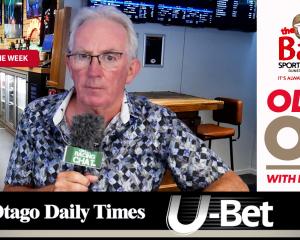Our week-long series examining sport's relationship with gambling has raised plenty of questions - and, hopefully, provided some answers. Adrian Seconi offers his final thoughts on the issue.
Tobacco's sugar-daddy relationship with sport was obscene but its replacement - gambling - is just benching Lucifer for Ivan the Terrible.
Before the word ''puritan'' crosses your lips, yes, we over-reached.
For most people, gambling is just a bit of fun.
But for others, gambling is devastating, and any funding model that exploits their misery ought to hold itself up to the light every now and then.
Instead, the only light that seems to get shone is on TAB bookmaker Mark Stafford and his slick sales patter, flogging the odds before an All Black test.
There are more than 50,000 problem or at-risk gamblers in New Zealand and their voice is often lost in the debate.
The focus is turned from their suffering to the children who would miss out on playing sport if the pokies money was taken away.
Really?
Sports administrators feared for the future of many events when tobacco was sent to the penalty box in the mid-1990s.
That Armageddon never eventuated and neither did Y2K a few years later.
The cost of delivering sport has certainly risen, and administrators will tell you it takes more than a few raffles and the odd sausage sizzle to make it accessible for the community.
Perhaps, but kids play sport because their parents encourage them, their friends play or they have seen it on television and want to be like Beckham/McCaw/McCullum.
That will continue with or without the community sports advisers, development officers or operation managers doing jobs previously held by volunteers.
And a lot of the money earmarked for the community is actually consumed by operational expenses.
It seems to us there is a vested interest in maintaining the narrative that sport would be lost without gambling's loot.
Perhaps the opposite is true with the TAB. It has a 9% share of the gambling market, with non-casino pokies (56%) dominating the sector.
The majority of people who present to the Problem Gambling Foundation or similar agencies do so because they are addicted to the bells and whistles of the one-arm bandits.
But sport has wider appeal, and has helped introduce a whole new demographic to gambling.
The TAB's sports betting business makes up 15% of its total turnover of just over $2 billion, yet sport received just $7.3 million in the last financial period - $5 million of which was tagged for national sporting bodies.
The wider sporting community is getting stiffed on that deal.
And thanks to sport, the TAB can offer an expanded list of products to its customers.
The gap between placing a bet and getting a result has shrunk thanks to options like first try scorer.
Research into problem gambling suggests the shorter the gap between placing a bet and seeing a potential return, the more problematic that form of gambling is.
And that is where Dave comes in - the problem gambler we spoke to at the beginning of the series.
He spent more than 30 years in gambling's grip.
We leave him the last word.
''They say the worst thing for a gambler is good luck. Even to this day, I have this belief that I won more than I lost.
''I just loved the idea of chasing something, of living this amazing life. But when I gave up gambling, I had no friends whatsoever.''
Clarification: Earlier in the series, we referred to the $78 million in grants the New Zealand Community Trust, the Southern Trust, Pub Charity and the Lion Foundation provided in 2012. That figure relates to grants made to the sport and recreation sector, of which 89% went to sport, with the remainder going to physical activity/recreation.












